Notary Public Underwriters Blog
Notaries, Know the Perils of AI
- Details
- Published: September 23, 2024

Should America’s notaries public rely on artificial intelligence (AI) to help them learn and practice the proper procedures of performing notarial acts?
One of AI’s main draws is its influence on productivity. Avid users of AI rely on it for all the perceived “mundane” research, writing and other tasks that take time away from actually engaging in the action-oriented areas of their expertise.
But the way that AI aggregates information on performance of notarial acts can make it seem that certain notarial acts can be performed in all states by all notaries, when that is not the case.
Take, for example, the notarial act of “signature witnessing.” When asked, “Can all notaries perform a signature witnessing?” a commonly used AI service responded in a way that would lead any reader—including an inexperienced notary—to believe that “signature witnessing” can be performed by any notary in any state:
Yes, generally speaking, notaries can perform the act of witnessing signatures. Witnessing signatures is a common notarial act where the notary public verifies that the signature on a document is made by the person purported to have signed it.
Again, this AI response suggests that notaries everywhere can perform the act of “witnessing signatures,” when only some states specifically authorize this notarial act.
For authoritative, reliable answers to their questions, America’s notaries public should contact:
- The office of the U.S. state or county official who issued the notary public’s commission. In many states, this person is the Secretary of State. Depending on the state, other officials who issue notary public commissions include the Governor, the director of the state division of corporations or licensing division, or the county clerk of the notary’s county of residence. These various officials typically provide their notaries public with publicly available information on the laws governing all aspects of being a notary and performing notarial acts, requirements for maintaining their valid commission status, notary stamp or seal requirements, and more.
- Their notary bonding agency, in states that require a notary bond. For example, our website offers notary training, aids to notarization, notary handbooks, and articles and tips on notarial practice.
- Professional notary organizations like the American Society of Notaries, the United States’ first professional organization for notaries public. ASN serves notaries nationwide. Since 1965, ASN has been a well-known resource for state-specific notarization requirements, as well as general notarial practices and principles applicable in all states.
Artificial intelligence is powerful, resource-rich and timesaving. Just remember that when it comes to authoritative information about performing notarial acts, your best resources are the notary-centric offices, businesses and professional organizations noted above.
Watch our YouTube Video
Related Article(s)
Can I Notarize When the Person Has No ID?
What to Do When the Notary Certificate Is Missing?
What Should I Do When There's No Room for My Notary Stamp?
Can I Notarize a Document That Is Already Signed?
Can a Notary Change a Document’s Date?
How to Notarize Signatures on Handwritten Documents
What to Do When Names Don’t Match on the ID and Document
Is a Notarization Valid Without the Notary Stamp on the Document?

